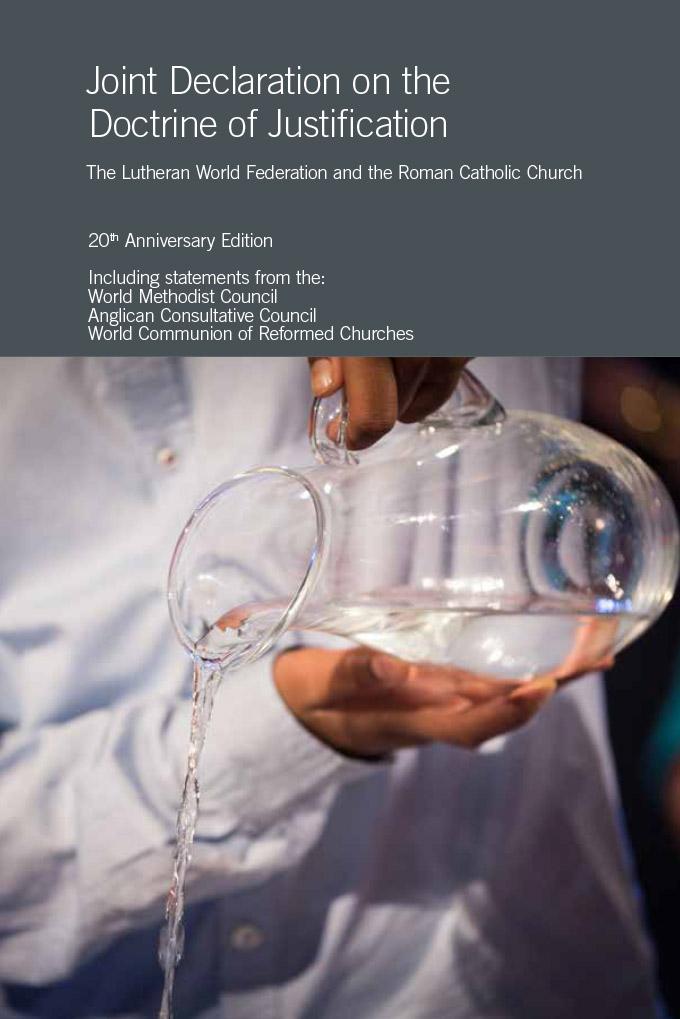
Doctrine of Justification
20th Anniversary Edition
By Dr Ian Watson, County Ecumenical Officer for Churches Together in Norfolk and Waveney (NWCT)
I recently experienced a conversation between a number of Christians from different churches in relation to the historical disagreements on the Doctrine of Justification. It somewhat surprised me because they did not seem to appreciate the degree of consensus that has been reached between the different denominations on this central matter to our Christian faith.
One of the best sources I have come across to demonstrate this progress, in a most accessible and readable way, is The Joint Declaration on the Doctrine Justification (JDDJ) signed by Lutherans and Catholics on 31st October 1999 in Augsburg Germany.
This historical agreement resolved divisions on the “basic truths” of salvation as a free gift from God. Crucially, it was later affirmed by the World Methodist Council (2006), the Anglican Consultative Council (2016), and the World Communion of Reformed Churches (2017). These affirmations translated the original JDDJ into a multilateral agreement between five equal partners. In 2019, all five partners jointly re-affirmed their commitment to the JDDJ at a consultation at the Notre Dame University (USA).
It is worth quoting from the subsequent Notre Dame University Statement:
“In a broken, divided and contentious world, we as representatives of five world communions, Anglican, Catholic, Lutheran, Methodist and Reformed, have met at the University of Notre Dame, Indiana USA, from 26th to 28th March 2019, drawn by a common urgency to present the message of God’s liberating grace and hope for this world. We are convinced of the power of the gospel of Jesus Christ to transform us and the world and we are committed to witness more effectively together to the salvation given to us in Christ (Romans 1:16).
“We believe that the Holy Spirit has brought us together following our agree- ment on the doctrine of justification, expressed in the Joint Declaration on the Doctrine of Justification (JDDJ) which states that: “Together we confess: By grace alone, in faith in Christ’s saving work and not because of any merit on our part, we are accepted by God and receive the Holy Spirit, who renews our hearts while equipping and calling us to good works” (para.15). This Trinitarian approach is important for us in understanding justification and sanctification fully.”
It ends by stating:
“Our churches face similar challenges in communicating the meaning of justification to today’s society in ways which meet the experiences and needs of the world. We are gripped with the imperative of proclaiming the good news of salvation, through compassion and working for justice. Yet the message has not reached and engaged with all of humankind. There is a challenge for us to witness to God’s liberating grace in ways which provoke and convey the hope and grace of the gospel.
“To proclaim God’s grace in our time requires connecting the distinct horizons of justification in biblical times with contemporary perspectives. Language from our traditions about the human person before God, grace and sin, forgiveness and righteousness, must come alive for people today.
“This work requires careful ecumenical study at all levels, locally, regionally and globally. Such bridging work results also in fresh proclamation. The world is in need of the message of God’s liberating grace. In a time of individualism and commodification, we want to stand together to offer the message that God’s salvation, human beings, and creation are not for sale.” (29 March 2019)
I find these sentiments in the statement incredibly beautiful and highly relevant in how Christian’s walking together can positively respond to the challenges of secularism in the twenty-first century. A challenge that the senior Church leaders of Churches Together in Norfolk and Waveney will hopefully be addressing over the next 12 months in a series of opinion pieces.
Some of you will have already read the JDDJ but for those who have not you can access a pdf copy here.
I commend the document to you, and like me, I hope you enjoy reading it and be encouraged by the progress made on the basic truths of the Doctrine of Justification. May the Holy Spirit bring to completion the ecumenical work of us all in answering our Lord’s Prayer that we may be one.
Dr Ian Watson
County Ecumenical Officer